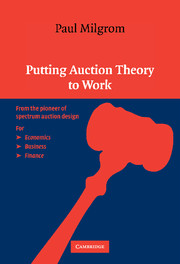Book contents
- Frontmatter
- Contents
- Preface
- Foreword by Evan Kwerel
- PUTTING AUCTION THEORY TO WORK
- 1 Getting to Work
- PART I THE MECHANISM DESIGN APPROACH
- 2 Vickrey–Clarke–Groves Mechanisms
- 3 The Envelope Theorem and Payoff Equivalence
- 4 Bidding Equilibrium and Revenue Differences
- 5 Interdependence of Types and Values
- 6 Auctions in Context
- PART II MULTI-UNIT AUCTIONS
- Bibliography
- Author Index
- Subject Index
- References
2 - Vickrey–Clarke–Groves Mechanisms
Published online by Cambridge University Press: 05 June 2012
- Frontmatter
- Contents
- Preface
- Foreword by Evan Kwerel
- PUTTING AUCTION THEORY TO WORK
- 1 Getting to Work
- PART I THE MECHANISM DESIGN APPROACH
- 2 Vickrey–Clarke–Groves Mechanisms
- 3 The Envelope Theorem and Payoff Equivalence
- 4 Bidding Equilibrium and Revenue Differences
- 5 Interdependence of Types and Values
- 6 Auctions in Context
- PART II MULTI-UNIT AUCTIONS
- Bibliography
- Author Index
- Subject Index
- References
Summary
This chapter describes the important contributions of Vickrey, Clarke and Groves (VCG) to the theory of mechanism design. Vickrey (1961) analyzed a situation in which bidders compete to buy or sell a collection of goods. Later, Clarke (1971) and Groves (1973) studied the public choice problem, in which agents decide whether to undertake a public project – e.g. construction of a bridge or highway – whose cost must be borne by the agents. This latter analysis formally includes any choice from a finite set. In particular, it includes the Vickrey analysis for the case of discrete assets. We limit attention in this chapter to the case of finite choice sets to bypass technical issues associated with infinite choice sets, particularly issues associated with the existence of a best choice.
The VCG analysis has become an important standard. It is the work by which nearly all other mechanism design work is judged and in terms of which its contribution is assessed. As we will see in later chapters, there are deep and surprising connections between the VCG theory and many other parts of auction theory.
Formulation
We begin the theoretical development in this section by introducing notation and defining direct mechanisms and VCG mechanisms.
Thus, let N = {0, …, n} denote the set of participants, with participant 0 being the mechanism operator. Let X denote the set of possible decisions with typical element x.
- Type
- Chapter
- Information
- Putting Auction Theory to Work , pp. 45 - 63Publisher: Cambridge University PressPrint publication year: 2004



